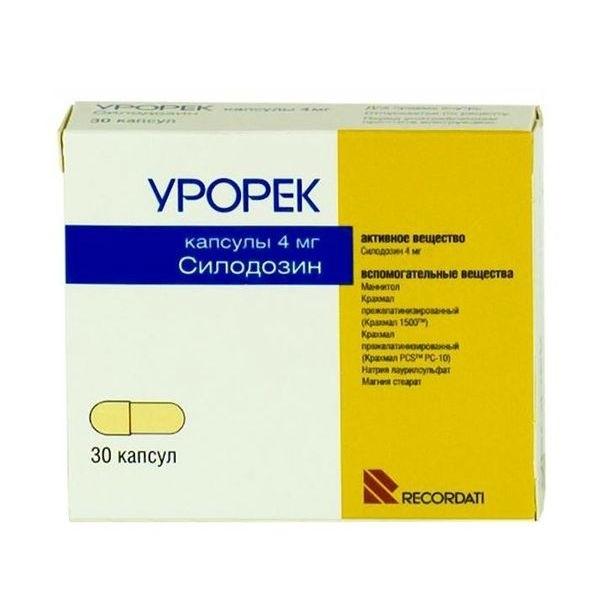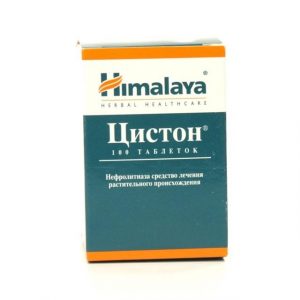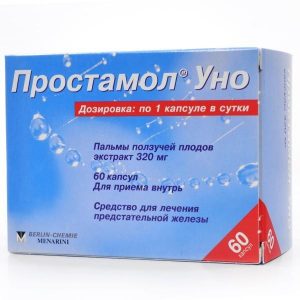Description
Release form
Urorek. Capsules
Packing
30 pcs.
Pharmacological action
Urorek is a highly selective competitive antagonist of alpha 1a-adrenergic receptors, blocks postsynaptic alpha 1a-adrenergic receptors located in the smooth muscles of the prostate gland, neck of the bladder and prostatic urethra. Reduces the tone of the smooth muscles of the prostate gland, bladder neck and prostatic urethra, improving urine outflow. At the same time, the symptoms of obstruction and irritation associated with benign prostatic hyperplasia are reduced. Affinity for alpha – 1a-adrenergic receptors located in the bladder are 162 times greater than its ability to interact with alpha-1b-adrenergic receptors, which are located in the smooth muscles of blood vessels. Due to its high selectivity, it does not cause a clinically significant decrease in blood pressure (BP) in patients with initially normal blood pressure.
Indications
Benign prostatic hyperplasia.
Contraindications
Hypersensitivity to the active substance or to any of the excipients.
components or their intolerance.
Children under 18 years.
Severe renal failure (creatinine clearance less than 30 ml / min).
Severe liver failure (insufficient clinical data).
Special instructions
As with other alpha1-blockers in the treatment with silodosin, a decrease in blood pressure, orthostatic hypotension can be observed. At the first signs of orthostatic hypotension (dizziness, weakness), the patient should sit down or lie down and remain in this position until the symptoms of orthostatic hypotension disappear.
Since benign prostatic hyperplasia and prostate tumors have similar symptoms and can develop together, patients with suspected benign prostatic hyperplasia should be examined before prescribing the drug to exclude prostate tumors.
In patients taking or taking alpha1-blockers, flabby iris syndrome may occur during cataract surgery, which can lead to complications during surgery. It is necessary to stop treatment with alpha1-blockers 1-2 weeks before such an operation. Patients who are prescribed surgery for cataracts are not recommended to start treatment with Urorek.
Influence on the ability to drive vehicles and control mechanisms: no studies have been conducted on the impact on the ability to drive vehicles and equipment. However, patients should be informed of the possible manifestations of symptoms, associated with orthostatic hypotension (for example, dizziness), and also warn that you should refrain from driving vehicles and equipment until the individual tolerance of the drug Urorek is clarified by the patient.
Composition
1 capsule contains: silodosin 4 mg
Dosage and administration
Recommended dose – 8 mg 1 time / day, with meals, preferably at the same time of day. It is necessary to swallow the whole capsule, preferably with a glass of water.
In the treatment of patients with moderate renal failure (CC from 30 to 50 ml / min)
It is recommended to take the drug at a dose of 4 mg / day during the first week, with good individual tolerance, then the dose can be increased to 8 mg / day.
In severe renal failure
Prescribing silodosin is not recommended.
Side effects
From the central nervous system: often – dizziness frequency unknown – syncope.
From the cardiovascular system: often – orthostatic hypotension.
From the respiratory system: often – nasal congestion.
From the digestive system: often – diarrhea infrequently – nausea, dry mouth.
From the reproductive system: very often – retrograde ejaculation, anejaculation infrequently – decreased libido, erectile dysfunction.
Other: frequency unknown – intraoperative flabby iris syndrome during cataract surgery.
Drug Interactions
Combination with other alpha-blockers is not recommended due to possible potentiation of the action. The combined use of inhibitors of the CYP3A4 isoenzyme (ketoconazole, clarithromycin, itraconazole, ritonavir) is not recommended, because increases the concentration of silodosin in plasma. PDE5 inhibitors (sildenafil, tadalafil) when used together may increase the risk of dizziness. Antihypertensive drugs (beta-blockers, calcium antagonists, drugs acting on RAAS, diuretics) when combined, enhance orthostatic hypotension.
Overdose
Symptoms: marked decrease in blood pressure, compensatory tachycardia.
Treatment: gastric lavage, intake of activated charcoal or an osmotic laxative, symptomatic therapy aimed at increasing bcc, vasoconstrictor drugs. Monitoring kidney function. Dialysis is ineffective due to the intense binding of the drug to plasma proteins.
Storage Conditions
The product should be stored in a dry, dark place out of the reach of children at a temperature not exceeding 30 ° C.
Expiration
2 years.
active substance
Silodosin
conditions granted through pharmacies
In retseptu
lekarstvennaja form
kapsul
Recordati Chemical and Pharmaceutical Industry, Italy




